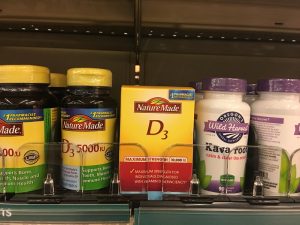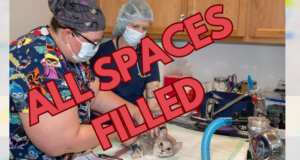Sometimes I find it easier to write in public places, where there is no laundry calling my name. One such time recently, as I was researching a topic, I was also eavesdropping on a gaggle of women comparing their vitamin D test results. Apparently, they had all been told, in the last five years, that they were deficient in vitamin D and were comparing their “numbers” and supplements.
 I remember years ago my doctor saying something about vitamin D deficiency becoming increasing common, but didn’t think could apply to me.
I remember years ago my doctor saying something about vitamin D deficiency becoming increasing common, but didn’t think could apply to me.
After all, I was out in the sun often and ate oily fish. I figured that was sufficient and hadn’t given the topic much thought. That is, until listening to the passion these women brought to the topic of their test results and supplements.
Being curious about the vitamin D question, I did some research. Rather than a nice tidy answer, I discovered that where vitamin D is concerned, doctors and scientists are divided and contradictory in how they interpret the research data and make recommendations to their patients.
 Vitamin D is absorbed through the skin when exposed to the sunshine. Thus, it’s nickname the “Sunshine Vitamin.” But vitamin D isn’t technically a vitamin: that is, a substance that your body requires for well-being but cannot manufacture on its own.
Vitamin D is absorbed through the skin when exposed to the sunshine. Thus, it’s nickname the “Sunshine Vitamin.” But vitamin D isn’t technically a vitamin: that is, a substance that your body requires for well-being but cannot manufacture on its own.
Vitamins A, B and C are substances that our body needs to be healthy but cannot manufacture, so we have to get them from our diet.
Vitamin D, on the other hand, is a hormone the body creates when the skin is exposed to sunlight. It is crucial for absorbing calcium.
The disease rickets is a consequence of a lack of vitamin D, when the calcium and phosphorous cannot be taken into the bones, leaving them weak and deformed.
 The one area where doctors and researchers seem to agree on vitamin D is in preventing osteoporosis. The body requires adequate levels of vitamin D in order to absorb the calcium, but too much vitamin D can cause other complications such as kidney stones and heart arrhythmias. If you take vitamin D to prevent bone loss, work with your doctor for the correct dosage, and don’t think that more is better.
The one area where doctors and researchers seem to agree on vitamin D is in preventing osteoporosis. The body requires adequate levels of vitamin D in order to absorb the calcium, but too much vitamin D can cause other complications such as kidney stones and heart arrhythmias. If you take vitamin D to prevent bone loss, work with your doctor for the correct dosage, and don’t think that more is better.
In addition the sunshine, we also get vitamin D from fortified foods such as milk and processed cereals, and naturally from wild salmon, tuna and sardines. You can also take cod liver oil, which is an acquired taste but has excellent health benefits.
Researchers speculated that vitamin D deficiency could be responsible for myriad other conditions as well, including heart disease, diabetes, obesity and depression.
Michael F. Holick, M.D., PhD is responsible for the boon in industries that sprang up in response to his claims that people can’t get enough vitamin D from sun exposure and diet alone.
 Other researchers say we typically get plenty of vitamin D. They say people who live in northern climates, who see very little sunshine through the winter, probably don’t get enough Vitamin D. These are typically climates where eating oily fish such as salmon and mackerel, for example, is a strong cultural norm.
Other researchers say we typically get plenty of vitamin D. They say people who live in northern climates, who see very little sunshine through the winter, probably don’t get enough Vitamin D. These are typically climates where eating oily fish such as salmon and mackerel, for example, is a strong cultural norm.
Within the last 10 years, in response to Dr. Hilock suggesting that the minimum daily requirement for vitamin D should be increased to 30 nanograms per milliliter of blood, laboratories have created the tests and supplement companies have developed the products you can buy to solve your vitamin D deficiency. But, lets be clear, the only reason everyone you know is now considered vitamin D deficient is because the standards have changed. distorting what we consider ‘normal’.
 There is no body of research supporting the claims that vitamin D is the cure-all Dr. Hilcock suggests.
There is no body of research supporting the claims that vitamin D is the cure-all Dr. Hilcock suggests.
In fact, evidence is building that too much vitamin D can be detrimental to your health.
The Institute for Medicine published a piece in the New England Journal of Medicine in 2011 stating that, “Blood levels of vitamin D need not be as high as many physicians and testing companies had been advocating, and high doses of the vitamin could actually cause harm.”
So, now that we have competing recommendations on vitamin D, what’s the solution?
As always, having a frank conversation with your health care provider is important. So is taking responsibility for your health.
 While it is extremely important not to expose our skin to the point of sunburn, most of us can spend some amount of time in the sun absorbing UVB rays and building up a tolerance safely. Follow this link for details on maximizing vitamin D.
While it is extremely important not to expose our skin to the point of sunburn, most of us can spend some amount of time in the sun absorbing UVB rays and building up a tolerance safely. Follow this link for details on maximizing vitamin D.
Unless there is a specific reason to take a supplement, you’re may be wasting your time and money. Vitamins, minerals and other micro-nutrients work together in synergy; that is, the substances interact with each other for the greatest benefit.
The solution to many conditions, including possible low vitamin D levels, is to eat a healthy varied diet, avoid processed foods, and don’t be afraid to get outside and enjoy the sunshine!
Virginia Eaton is a health and fitness coach helping people reorganize priorities.




